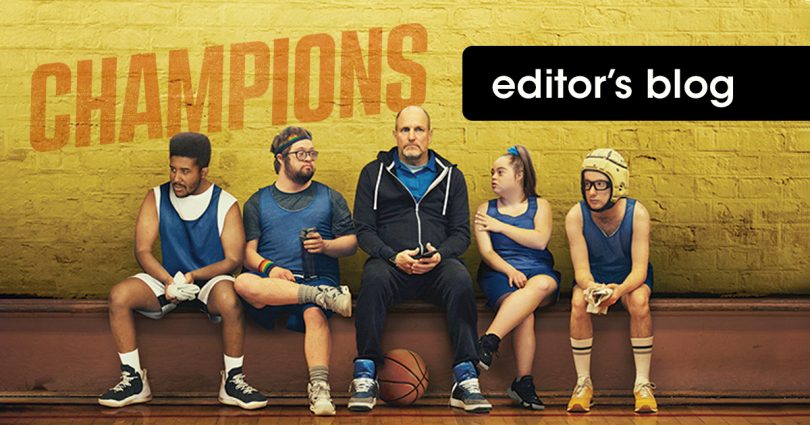As a society, we have come a long way from the time when people with developmental or intellectual disabilities were hidden away in asylums. But we haven’t come far enough.
There are too many people in our world who look at the appearance of a person and see only what that person can do or what he can offer society. These are the people we still need to reach. These are the ones whom we must show that a human being is valuable just because he’s a human being and not because of what he can or cannot do.
We need to somehow educate those people who don’t spend hours every day poring through pro-life materials, who don’t watch Christian programming, and who have never met someone with an intellectual disability. We need to reach the people who still use the word “retarded” to refer to a person who may struggle in some area of learning or understanding.
Woody Harrelson’s latest movie Champions does just that.
Harrelson plays a hotheaded assistant basketball coach named Marcus Markovich who gets a DUI and opts for community service rather than jail time. His community service is to coach basketball to a group of young developmentally disabled adults who aspire to make it to the Special Olympics championship.
In many ways, it’s a predictable story, but it teaches an important lesson—and in our day and age, these lessons must be repeated over and over so that they are heard above the increasingly loud woke crowd. People with developmental or intellectual disabilities are human beings who have the same dignity that those without a disability have. Each person has special gifts and talents, and each deserves to be treated with kindness and respect.
The movie drives this home in a scene where Marcus and Julio—the head of the community center where the young people play basketball—conversed about each of the players. The beauty of this is that Julio didn’t focus on the disability but on the person. He didn’t say Johnny has Down syndrome. He talked about what Johnny could do. He told Marcus about each player’s abilities, about their jobs and their families, and what they liked to do for fun. He explained that they all live full lives. And then he smiled and remarked, “We all have something.”
Indeed; we all have something. None of us is perfect. Focusing on weaknesses rather than strengths serves only to suffocate and stifle a person’s abilities. But when we focus on strengths, we allow people to flourish.
It seems that Marcus has that ability. And throughout the movie, we see a transformation in him that is necessary for all of us.
At the beginning of the movie, when Marcus learned that he would be coaching people with intellectual disabilities, his first instinct was to call them “retarded.” He didn’t say it in a cruel or denigrating way; he was simply ignorant. He represents so many people today who simply don’t understand that a disability does not diminish a person’s worth.
When Marcus entered the gym and met his new team for the first time, he did so with both an open mind and an open heart. He didn’t always know the right thing to say, but he tried. He got to know his players as human beings and friends. He learned their likes and dislikes, their strengths and weaknesses, and their sense of humor and their fears. And of course, they taught him more than he taught them. Marcus grew not only as a coach but as a person.
While from the outset it was clear how the plotline would resolve, the overall message is one we can’t stress enough. Movies like Champions serve to educate those who don’t understand disabilities.
Unfortunately, the movie isn’t for young children, as it earned its PG-13 rating because of sexual innuendo, some sexual references, and a bit of language. It could have been done without all these things, of course, and it’s a sad reflection of our culture that these components couldn’t have just been left out. But if you can get past the handful of PG-13 comments and references, you’ll find a sweet movie that stresses the value of all people, and you’ll see a fun movie that teaches that it’s not what a person can offer the world that makes them valuable, it’s their humanity.
The more we repeat this truth, the more people will understand and live it.
Champions is a lighthearted movie that will attract an audience who may have never heard this message or who really needs to hear it. These are the kids who bully others in school, the employers who discriminate, the parents who are scared to give birth to a child who may face a lifetime of disabilities, and the doctors who spread misinformation about what a child with a disability will or will not be able to do. These are the people who need to know that life may not always be perfect, that disabilities don’t define us, and that our value isn’t diminished because of a disability.
Society may no longer lock away people with disabilities, but neither does it always welcome them. Through our actions and our words, we can work to change that and teach that all people have dignity. Movies like Champions help us teach this truth—and that’s a truth we can’t shout loudly enough.
This article first appeared in the Catholic World Report at catholicworldreport.com/2023/03/14/champions-teaches-vital-lesson-about-people-with-disabilities.


Facebook Comments